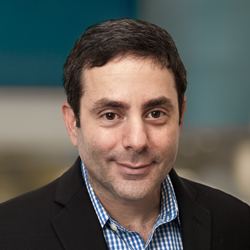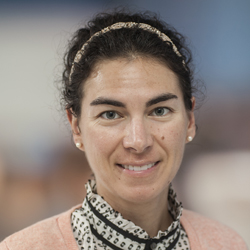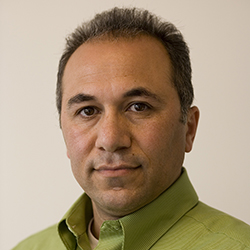November 14, 2024 – An aspiring global effort to change treatment and care for children with blood cancers through research, advocacy and patient support is making inroads, thanks in part to the leadership and vision of Seattle Children’s Todd Cooper, DO, section head of Oncology and a researcher in Seattle Children’s Research Institute’s Ben Towne Center for Childhood Cancer and Blood Disorders Research.
 Dr. Todd Cooper
Dr. Todd CooperDr. Cooper is co-chair of the Leukemia & Lymphoma Society’s (LLS) Pediatric Acute Leukemia (PedAL) Initiative, the first integrated worldwide pediatric acute leukemia drug development effort, launched three years ago to test new, safer therapies for young patients who are matched to treatments based on their unique biology. Patients at Children’s have access to many of PedAL’s clinical studies.
PedAL is a focus of LLS’s Dare to Dream Project to accelerate more effective treatments for kids with blood cancers, along with support services, advocacy efforts and funding for clinical studies and drug development.
Because blood cancers are more common in adults, there has been less incentive to develop new treatments for children. As a result, pediatric progress has lagged — only five cancer treatments have been approved for use in children with blood cancers since the 1990s. Less toxic treatments are also needed, as 80% of childhood cancer survivors develop chronic health conditions from their treatments.
“This is an incredibly important and ambitious initiative,” said Dr. Cooper, former director of Children’s Leukemia and Lymphoma Program, who also helped develop Children’s High-Risk Leukemia Program. “There have definitely been challenges in overcoming some of the barriers to early phase clinical trial development that we are learning from, and we've made huge progress in surmounting many of these with the help of LLS and Dare to Dream.”
Dr. Cooper, who also chairs the Children’s Oncology Group (COG) Myeloid Diseases Committee, said LLS has convened some of the best minds in cancer research through partnerships with COG, the National Cancer Institute and the European Pediatric Acute Leukemia (EuPAL) Foundation. With these partnerships, PedAL taps into established infrastructures to make screening and therapeutic trials available to more children.
Offering Hope Through Cancer Clinical Studies
The PedAL Screening Trial, which opened in April 2022, identifies the distinct tumor biology of each child’s cancer. Based on this tumor biology, families in North America, Australia and New Zealand can then enroll eligible children in a PedAL therapeutic clinical study or any other trial that best meets their needs. The trial contributes to a longitudinal data registry and biobank for relapsed (the cancer returned after it went away for a period) leukemia. In parallel, the EuPAL Foundation has established a registry for pediatric relapsed leukemia patients.
“The screening trial is a key component of our efforts, and it’s going well,” said Dr. Cooper, senior author of a trial summary in the journal Blood. “We have over 360 children enrolled, including patients from Children’s. PedAL’s data will be linked to European registries, and we’re collecting data in a uniform manner so we can reuse the data for regulatory purposes and to inform future trials.”
We're using the tools such as the registry and available clinical trials to offer kids more therapies. Pediatric drug development is difficult but we're making huge strides via this initiative to overcome that.
— Dr. Todd Cooper
 Dr. Katherine Tarlock
Dr. Katherine TarlockPedAL is also conducting an international Phase 3 clinical study for children with relapsed acute myeloid leukemia (AML). While the prognosis for many kids with AML is good, the probability of survival after relapse is 38%. The APAL2020D study of venetoclax in combination with chemotherapy is led at Children’s by Katherine Tarlock, MD, co-director of the High-Risk Leukemia Program and a researcher in the Ben Towne Center for Childhood Cancer and Blood Disorders Research. AML relapse is driven by chemotherapy-resistant stem cells. One mechanism of this chemotherapeutic resistance is the overexpression of the protein B-cell lymphoma 2, which helps cancer cells survive longer in the body and makes them resistant to cancer medicines. Venetoclax is a medicine that inhibits these B cells and causes the death of cancer cells.
“European collaboration for venetoclax and screening trials is so important, both to accrue rare subsets of patients and also to fulfill regulatory requirements from both the United States and Europe, with the goal of leading to approval of these drugs in kids so that kids have more access to these treatments,” Dr. Cooper said.
Additionally, PedAL launches an international Phase 1 trial in December of a new targeted medicine called ziftomenib with industry partner Kura Oncology. Ziftomenib blocks the interaction of menin (a protein that controls gene expression and cell signaling) with two genes that are often mutated or rearranged in acute leukemia. By preventing menin from binding to these genes, this new class of drugs can stop the abnormal gene expression that drives leukemia growth. This study will also be open to patients at Children’s.
“We have other PedAL-associated trials that are either open or in development, and we're having discussions with multiple other industry partners about clinical trials for their drugs in kids,” Dr. Cooper said.
‘A Multi-Pronged Approach’ for Kids Facing Cancer
He points to the Dare to Dream Project’s efforts to advocate with governments to advance the availability of compassionate-use therapies (using a new, unapproved medicine when no other treatments are available) to provide a resource for families and their physicians facing relapsed or refractory (stopped responding to treatment) leukemia, for which a trial is not open.
The project also supported the bipartisan Accelerating Kids’ Access to Care Act, legislation approved by the U.S. House of Representatives in September. It breaks down barriers for children with complex medical conditions like cancer to make it easier for families to access out-of-state specialized care without delay by facilitating coordination across state lines with state Medicaid programs. This ensures pediatric patients have timely access to the specialized care they need, regardless of where they live.
“It’s not all about screening and clinical trials,” Dr. Cooper said. “It’s a multi-pronged approach that can help current patients.”
Early on, the researchers identified global data sharing as a significant need to further their work. Because relapsed/refractory AML and high-risk genetic alterations occur in a small subset of patients, pooling data is critical. In 2019, a data dictionary — a standardized representation of AML patient data from pre-existing clinical trials case report forms — was created. From that, the International Acute Myeloid Leukemia (INTERACT) Consortium was established in 2021 to pool and share data.
 Dr. Soheil Meshinchi
Dr. Soheil MeshinchiDr. Cooper and other leaders of the effort presented a project abstract at August’s ASCO Breakthrough Meeting in Japan. As of April 2024, the data dictionary includes 157 standardized data elements that were used to harmonize clinical data (taking information from diverse sources and removing errors to create accurate information) on 3,413 patients who participated in seven clinical trials conducted by four pediatric oncology cooperative groups across the United States, Europe and Asia. Elements in the data dictionary include demographics, initial disease characteristics, genetic alterations and survival status. Ongoing work to add more studies to the database will increase the number of patients represented to over 6,000.
Dr. Cooper also cited the leadership of Fred Hutchinson Cancer Center’s Soheil Meshinchi, MD, PhD, who is leading PedAL’s therapeutic target discovery and biomarker work. Dr. Meshinchi is an attending physician at Children’s and a researcher in Seattle Children’s Research Institute’s Center for Clinical and Translational Research.
“The leadership coming out of Seattle is wonderful, and we're using the tools such as the registry and available clinical trials to offer kids more therapies,” Dr. Cooper said. “Pediatric drug development is difficult but we're making huge strides via this initiative to overcome that.”
— Colleen Steelquist
About the Ben Towne Center for Childhood Cancer and Blood Disorders Research
The physician-scientists at Seattle Children’s Ben Towne Center for Childhood Cancer and Blood Disorders Research are working hard to improve treatments and outcomes for children with cancer and blood disorders, offering patients the very latest treatments through clinical trials. In the lab, researchers are making advances that are leading to new ways of diagnosing and treating these illnesses. Learn more.
